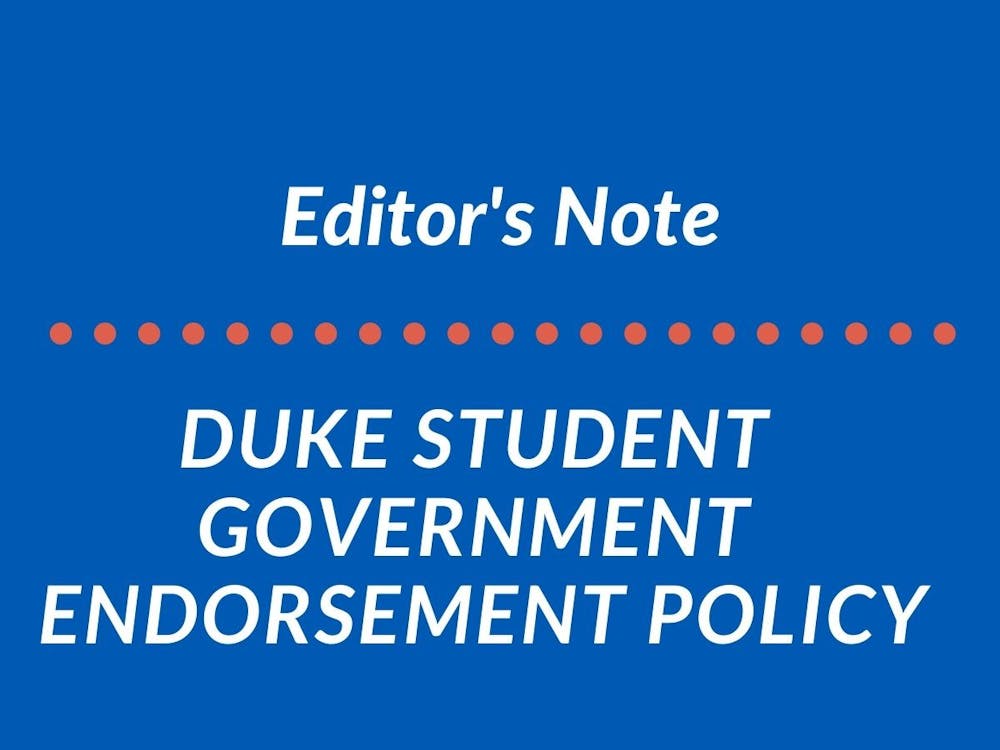The Chronicle will be publishing endorsement letters for the 2020 Duke Student Government elections from Sunday, March 1 to Wednesday, March 4 at 11:59 p.m. The positions of president and executive vice president are available for endorsement. No endorsements will be published the days of the election. The final deadline for endorsements is 8 p.m. on Wednesday, March 4.
This year's candidates for president are juniors Tommy Hessel and Valeria Silombria. Candidates for executive vice president are junior Kait Boncaro and sophomore Dina Qiryaqoz. Read The Chronicle's primer on the candidates here. The election will take place online from Thursday, March 5 at noon to Friday, March 6 at noon.
We will accept letters from any and all student organizations, so long as the groups adhere to the rules stipulated below. We will not accept personal endorsements from individuals. We encourage groups to make endorsements for both positions.
1. Organizations must offer to meet with all candidates for any position being endorsed, and the candidates must be given at least 24 hours to respond. If a candidate voluntarily declines to meet, the endorsement meeting may go on as scheduled, and the candidate's absence must be noted in the endorsement letter.
2. In the endorsement process, organizations must give equal speaking and questioning time to each candidate for each office. No candidate may receive more time than another.
3. Members of organizations who decide they want to participate in endorsements for a position must remain in the room for every candidate's appearance. Members may not leave and return, or arrive late. If they do so, they may not participate in any portion of the endorsement process for that position, including deliberations and voting.
4. To avoid even the appearance of impropriety, The Chronicle expects that members of organizations with significant personal or professional attachments or associations with candidates will remove themselves from the endorsement process for that position. This includes public or substantial participation in the campaign of any one individual. Any conflict of interest that would jeopardize a non-prejudiced review and consideration of a candidate should result in a recusal. If a member of an organization recuses him or herself due to conflicts of interest with any one candidate for a position, that member may not participate in the endorsement process at all for that position. This includes asking questions in meetings with the candidates and writing the endorsement.
5. If one of the candidates currently is or was previously a president or officer of an organization, that organization is precluded from issuing an endorsement for that position.
6. If an organization wishes to publish an endorsement letter, the president of the organization must email editor-in-chief Jake Satisky (jacob.satisky@duke.edu) and opinion editor Leah Abrams (leah.abrams@duke.edu). All candidates running for each endorsed position must be CC'd on the email as well. The email must include an attached endorsement letter as a word doc and the following statement: “I, the president of [organization name], certify that all Chronicle endorsement rules were followed in the formulation of this letter. I understand that failure to adhere to the rules undermines the election process, as well as the integrity of my organization and The Chronicle.”
7. Endorsement letters must be signed by the leader of the student organization and include his or her full name, school and graduation year.
8. If a candidate wishes to challenge an endorsement letter on the grounds that any of rules above have been violated, he or she may submit by email a formal challenge to the editor-in-chief stating his or her claims. The president of the organization must be CC'ed and may respond to the challenge. This challenge must be received within three hours of the endorsement letter email sent under Rule 6. The Chronicle retains the final and exclusive right to adjudicate the merits of any such challenge.
9. There is no guarantee that endorsement letters will be published. The letters with the greatest likelihood of being published are those that arrive earliest and are concise. Letters may not exceed 325 words. Organizations submitting endorsement letters are encouraged to register their endorsements through DSG and receive more information about the position of DSG president and executive vice president.
10. If The Chronicle determines that any of the aforementioned rules have been violated in the formation of an endorsement letter, that letter will not be published.
Get The Chronicle straight to your inbox
Signup for our weekly newsletter. Cancel at any time.

Leah Abrams is a Trinity senior and the Editor of the editorial section. Her column, "cut the bull," runs on alternate Fridays.

Jake Satisky was the Editor-in-Chief for Volume 115 of The Chronicle.

